Christianity Today
A Great Awakening for America
America needs another Great Awakening, as great as the First, to counteract the moral inversion that prevails in America today.
America badly needs another Great Awakening – a return to the faith that informed the earliest settlers. This applies to both groups of early settlers – the Captain John Smith expedition and the Pilgrims and Puritans. For too long the United States government has maintained ambivalence at best, antipathy at worst, toward the Christian faith. This has resulted in practices that would certainly shock both Captain John Smith on one hand, and Elder Brewster and Governor William Bradford on the other. And that this result should come from an interpretation of the earliest Articles and Amendments to the Constitution, would shock the Framers, and especially the Second President of the United States. Without another Great Awakening, America will fall – and for reasons one old atheist historian actually admitted in his text.
The first Great Awakening
Historians recognize at least two Great Awakenings in early American history. Nevertheless, of the two, the first Great Awakening was the significant one. Spanning the period from 1720 to 1740, it was a protest against the atheistic or “deistic” Enlightenment. It was also an attempt to unite three disparate religious blocs among the American colonies:
- Congregationalism in the Massachusetts Bay Colony and other New England colonies (New Hampshire, Connecticut, and Rhode Island),
- Anglicanism (forerunner of the Episcopal Church in America) in the South (Delaware, Maryland, Virginia, the Carolinas, and Georgia), and
- Quakerism, Lutheranism, Dutch Reformed, and Presbyterianism in the Middle Colonies (New York, New Jersey, and Pennsylvania).
This division weakened the idea of faith, and men turned to their wealth, social standing, and “reasoning ability” for comfort and answers. Jesus Christ famously said,
No one can serve two masters; for either he will hate the one and love the other, or he will be devoted to one and despise the other. You cannot serve God and wealth. Matthew 6:24, NASB
How true that was, and is. Men like Jonathan Edwards and George Whitefield reminded people of this and other facts. Whitefield especially preached to all persons, “great and small, rich and poor, free and slave,” as St. John of Jerusalem might have said. (See Revelation 13:16.) In essence, they told their listeners:
- Everyone falls short of the glory of God, and therefore
- Everyone needs salvation, without which they will die permanently separated from God. Happily,
- Salvation is open to everyone who will freely confess their sins, and ask God to forgive them, relying on Divine Grace.
- Ideally, one’s relationship with God must not be formal and rigid, but personal.
Effects – and decline
The First Great Awakening set forth many ideas that evangelical preachers preach today – especially about personal relationships with God. Not everyone agreed with these things, and that caused a split in the Christian community into “new lights” and “old lights,” depending on whether they embraced Edwards’ and Whitefield’s ideas, or not. This might also have informed the Establishment and Free Exercise Clauses of the First Amendment. But it also informed the “Black Robed Regiment” spectacle during the American War for Independence. And it led to the expansion of the Ivy League beyond its first two institution, Harvard and Yale. (Cornell would begin in 1865, the last year of the War Between the States.)
Historians point to a Second Great Awakening in the last decade of the eighteenth century, largely in New England. This led to the founding of colleges like the Little Ivies. An alleged Third Great Awakening, from 1850 to early in the Twentieth Century, would see the founding of Cornell University.
If some historians doubt that the Third Great Awakening amounted to anything, that’s because it ended with the accession of atheism as an unofficial policy of government, and prevailing theme in higher education. The Roaring Twenties likely ended it, as once again great wealth intoxicated the people. Among the Seven Deadly Sins, those of Envy, Gluttony, Greed, Pride, Sloth – and Lust – predominated. The role of Wrath is less clear, as most acts ascribed to it actually proceed from Envy, Greed and Pride.
Current dark spiritual state
Today America is in a dark spiritual place. From Charles Darwin comes the ultimate appeal to Pride, which its practitioners call Modern Science. The essence of Modern Science begins with the Theory of Evolution, which gives rise to Eugenics – the ideology of National Socialism in all its forms.
Pride combines with Lust to yield the ideology of abortion on demand. Wrath waits in the wings, ready to induce people to endorse murder to protect this “right.”
Greed and Envy work together to produce (non-national)socialism and its most extreme form,communism, in which the State owns everything. The Greed part manifests either as crony capitalism oras people seeking “pull” to get material rewards. Or else an official operates on Wrath to make others’ lives miserable as a primary gain. These officials also appeal to Sloth, at least in the early stages of their “revolution.”
But let us not forget Gluttony. Gluttony has produced a population having the lowest average health in history. The British statesmen who revived the Olympic Games must be spinning in their graves, despairing that anyone would qualify for these Games by the standards they laid down in 1896, the year of the First Modern Olympiad.
Will Durant, author of The Story of Civilization in eleven volumes, repeatedly said:
Religion attends the birth of civilization; philosophy accompanies it to its grave.
Though he never believed in any religious precept, neither did he ignore the salutary effect of religion, and the detrimental effect of prideful, anti-theist philosophy, on civilization.
Laying aside Divine authority
In fact, independent filmmaker Rich Christiano illustrated brilliantly, in 2002, one very likely reason the so-called Third Great Awakening failed. In Time Changer, with D. David Morin, Gavin McLeod, Hal Linden, and Jennifer O’Neill, Christiano flatly accused late nineteenth-century Christian apologists of disconnecting the Teachings of Christ from the Christ of the Teachings. Which they likely did – because the problem with sound moral doctrine is that it doesn’t lend itself to instant fulfillment. Gratification in the Christian system is delayed, almost by definition.
Now compare that to Modern Science and its centerpiece, Evolution. Evolution is all about instant rewards for behavior most would deride, even shudder at, as criminal. And today those realizing the ill-gotten gains know it. That’s why men like James G. Blaine, the Huxleys, John Dewey, Horace Mann, Roger Baldwin, Antonio Gramsci, and Karl Marx worked so hard to chase God from the public square.
Recognizing this, Christiano said to himself, I would love to pull one of those smug Bible professors one hundred years into their future – and our present. Which is exactly what he did in Time Changer. A professor presents a manuscript that proposes to teach Christian morals apart from Christ. A colleague, under rules requiring unanimity, says, in effect, “Veto! I forbid it!” But this colleague knows the secret of time travel. So he sends the writer forward a hundred years. What this person sees, has him completely revising his manuscript upon his return.
Toward a real Second Great Awakening
Obviously, had a thing like that happened, the prevailing conversation about morals and social “justice” would be far different. That’s why the so-called Second and Third Great Awakenings were not Great Awakenings in the sense of the First. They were aftershocks, like the aftershocks of any earthquake. And in the nineteenth century, a movement arose to put religion to sleep, or even to death.
A real Second Great Awakening must have all the energy of the First, and re-emphasize all the ideas that Edwards and Whitefield put forward. But it must also attack directly the ideas of Modern Science and the philosophy behind it. Modern Science, and Marxism, insist that God does not exist. Behold the devastation they have wrought!
Hence the need to promote Creationism – an observational model that says, quite simply, that the universe is not a Great Craps or Baccarat Table or Roulette Wheel. The universe had to have a Master Builder – the literal translation of the word Architect. This might seem scandalous to clergymen (and, ironically, clergy women) who insist that faith alone is sufficient. Sadly, the academic establishment, including the Ivy League, has fully embraced Modern Science, and its close cousin, Marxism. And they have had more than a century to tell people that God is not Real.
To have a relationship with Him, one must know that He is Real. And one must apply His teachings to political, educational, and other questions. A new Great Awakening must happen to reintroduce these teachings.
Terry A. Hurlbut has been a student of politics, philosophy, and science for more than 35 years. He is a graduate of Yale College and has served as a physician-level laboratory administrator in a 250-bed community hospital. He also is a serious student of the Bible, is conversant in its two primary original languages, and has followed the creation-science movement closely since 1993.
-
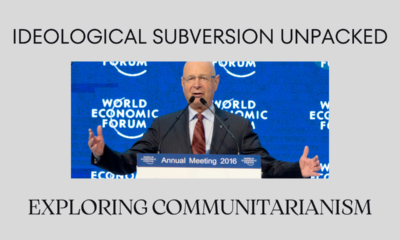
 Executive4 days ago
Executive4 days agoCHAPTER 43: Ideological Subversion, Communitarianism, and the 15-Minute City – Space Is No Longer the Final Frontier—Reality Is*
-

 Civilization4 days ago
Civilization4 days agoVoter Fraud—The ONLY Issue That Matters in 2024
-
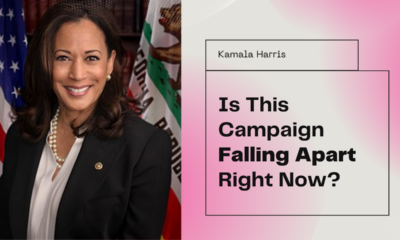
 Civilization3 days ago
Civilization3 days agoKamala Harris campaign dying
-

 Civilization3 days ago
Civilization3 days agoReal Candidate of the People?
-
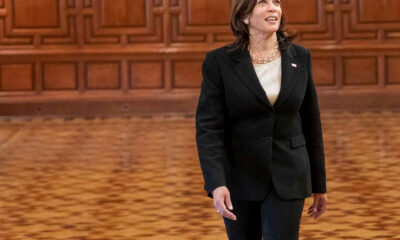
 Civilization2 days ago
Civilization2 days agoCBS Refusal To Release 60 Minutes Harris Transcript Indefensible
-
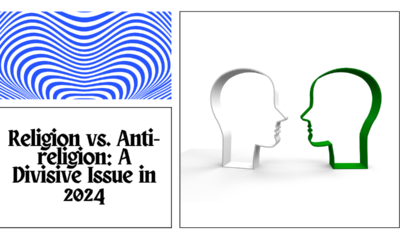
 Christianity Today5 days ago
Christianity Today5 days agoThe Religious Divide
-
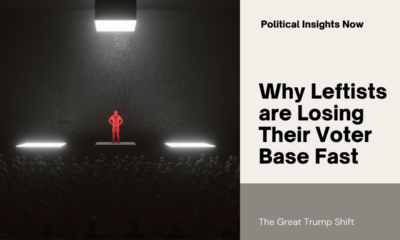
 Civilization2 days ago
Civilization2 days agoLeftists losing their constituencies
-

 Civilization16 hours ago
Civilization16 hours agoBiden calls for Trump to go to prison




